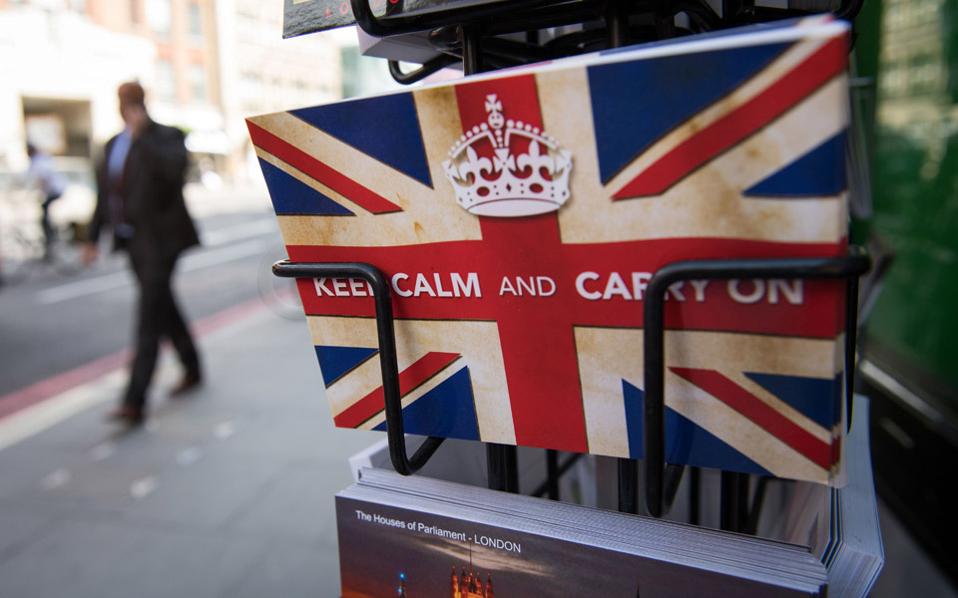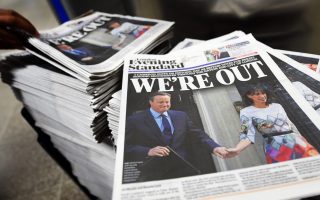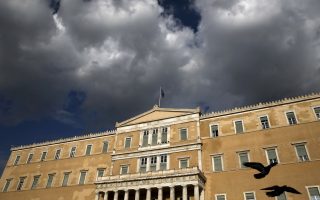Humpty Dumpty, Brexit and Europe

All children in the English-speaking world know the sorry tale of Humpty Dumpty, the anthropomorphic egg which “sat on the wall” and then had a great fall. “All the king’s horses and all the king’s men couldn't put Humpty together again,” the nursery rhyme concludes, in that mix of finality and levity that makes it unforgettable. The British, then, are among the peoples that have a sense of irreparable loss rooted deep inside them. And yet, in last week’s referendum, the majority showed such enmity to today’s European Union that they chose a leap into the dark. Now we get to see what those who preached to end 43 years of participation in the European project had in mind, what relationship the country will agree on with the other party in the divorce and how the EU will handle the crisis.
Suddenly, the dangers faced by the European Union have multiplied. The triumph of nationalist populism, the rejection of all warnings by experts and “elites” (at least in England and Wales, as Scotland and Northern Ireland voted to remain in the EU), underlines the power of fantasy over unsatisfactory reality. This mighty current encourages all enemies of European unification. Already, extreme right forces in other countries are calling for similar referendums. In Greece, the extreme left, in its own nihilist dead-end, is delighted to witness recklessness in action. The trend of “illiberal democracies” in the EU can only be strengthened by the British exit, as it undermines the EU’s authority and credibility. Countries that are among Greece’s lenders will be worrying about the EU falling apart and it is very difficult to imagine them being prepared to provide any more if the need arises. The reaction of the markets on the day after the referendum showed the magnitude of the earthquake that struck Europe. In such turmoil, with all eyes elsewhere, Greece must seek the best course on its own, as it can expect no support from any other quarter.
For the EU to hold together, its leaders must show greater capability in handling the crisis than they have shown so far. To “contain” Britain, which is suddenly in severe crisis, and to strengthen an undoubtedly weakened Union, they will have to arrive at a magical mix of determination and understanding; the leaders of the strongest countries and the heads of the most important EU institutions must manage to show that they care about the citizens of every country (including Britain) and also that they will do all that is necessary to hold the European Union together. This ambition was evident in the joint statement on Friday by the presidents of the European Parliament, the European Council, the European Commission and the prime minister of the Netherlands, which holds the EU’s rotating presidency. It was, however, weak on proposals.
The EU leaders made clear, regarding the British vote, that they “regret this decision but respect it.” They added: “This is an unprecedented situation but we are united in our response. We will stand strong and uphold the EU's core values of promoting peace and the well-being of its peoples. The Union of 27 member-states will continue.” It is striking how the “28” member-states are suddenly “27.” (Significantly, one day later, on Saturday, the ministers of the “six” founding members of the EU got together to make another joint statement. From 28, to 27, to six…) In their joint statement on Friday, the heads of the EU’s most senior institutions made clear that Britain must move quickly to set in motion the procedure of divorce. “There will be no renegotiation,” they said, regarding a now-canceled deal for further “opt-outs” that British Prime Minister David Cameron had worked out with the EU a few months ago. “Any agreement, which will be concluded with the United Kingdom as a third country, will have to reflect the interests of both sides and be balanced in terms of rights and obligations,” the statement said.
In other words, the EU’s immediate response to the British voters’ rejection of the Union was, “If you want to go, go quickly and don’t expect any favors.” Chancellor Angela Merkel noted, “There is no denying that this is a watershed for Europe and for the integration process.” She urged caution so that the best possible result might be reached. Even as she and other leaders consider what to do with the unprecedented problem of a country breaking away from the EU, they must keep their own voters in mind, knowing that it is to them that they owe their office. The future of Europe hangs on whether leaders will find the golden mean between national and collective interests, whether the continent’s nations will understand that their security and prosperity can only be sought through union and not through division and isolation. (German Finance Minister Wolfgang Schaeuble’s rush to pre-empt any motion by France and Italy for further union is a bad omen: If a leak from his ministry on Friday reflects his views, it indicates that the EU is far from having a coherent policy for this crisis… )
The EU’s handling of Brexit must discourage forces of fragmentation in other countries, but, at the same time, must not be vindictive, as that will serve only to strengthen the arguments of populists against the European Union. If the right policy is forged, the EU will emerge stronger from this crisis; if not, not only Britain will suffer Humpty Dumpty’s fate but Europe itself and all of its nations.





